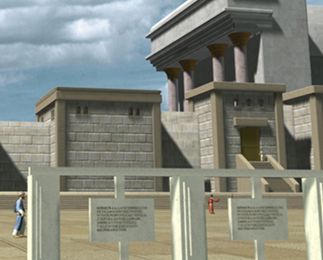The decisions of the apostles’ meeting
06-11-2017 - Posted by Andre PietUntil the end of the book of Acts, the people of Israel are leading. In chapter 1 the disciples ask the the Lord if He would be restoring the kingdom to Israel at that time (:6). To Israel it is preached that they should repent in order that the Messiah would return to establish his Kingdom (3:19-21). Until chapter 10 of the book of Acts, none of the apostles came to the idea to turn to anyone besides Israel. A whole lot was needed to convince Peter to go and tell the evangel to a god-fearing “sojourner within the gates”. And even when Paul turns to the nations, later, he always first visits the synagogue. Matters were discussed in Jerusalem and there “the decisions” were made.
The decisions of the apostles’ meeting
In Acts 15 the meeting of the apostles is described in which the matter was discussed whether believers from the nations (not Jews) were supposed to be circumcised and if they should keep the law of Moses. Unanimously Paul is supported and the decision is made that the nations are free from this law keeping. Nothing is imposed to the nations but to merely adhere to those things that have always been true for all people since Adam and Noah. In these decisions, the believers from the nations are exempted from circumcision and the keeping of the law of Moses. But the tens of thousands of believers from the circumcision, all remained undiminished zealots for the law (Acts 21:20). When Paul arrives in Jerusalem in Acts 21, just that is the focal point of the charge against him. He would teach the Jews abroad not to circumcise and not to live in the ways of Moses (Acts 21:21). Strictly speaking, this was not true, because Paul himself lived as a law abiding Jew (Acts 21:24). But indeed he taught that Jews are free to live in accordance with the law or not. And that was the annoyance in Jerusalem about Paul.
Two groups
During the history of the Book of Acts, there are two sharply distinct groups of believers in Christ. Those who are from Israel and those who are form the nations. Just like those two groups were also separated from each other in the temple. Only in the outer court, the nations were allowed to be, but definitely not inside. An intermediate wall (the so called soreq) stopped them. If anyone had the courage to trespass this as “heathen” it would irrevocably mean the death penalty. It is typical that Paul’s imprisonment in Jerusalem (Acts 21) was caused by Jews from Asia who believed that he would have brought a Greek into the temple. That was a fake accusation, but it strikingly typifies Paul’s reputation.
No longer two, but one
Later, When Paul arrives in prison in Rome, the ultimatum for Israel’s conversion passes (Acts 28:27). As he had already warned beforehand (13:40,41). Israel no longer has a special, separate status. In his ‘jail letter’, Paul expresses this new situation emphatically, especially in Ephesians 2:
(14) For He (= Christ) is our Peace, Who makes both one and razes the central wall of the barrier, (15) The enmity in His flesh, nullifying the law of precepts in decrees, that He should be creating the two, in Himself, into one new humanity…
Two groups are described here: the circumcision and the uncircumcision. Or: Israel and the nations (Eph. 2:11,12). Israel was appointed to be in a separate position, demarcated by “the law of precepts”. It is remarkable that Paul also mentions the “decrees” (Gr. dogmata). Here he refers to “the decisions” of the apostle meeting (Acts 16:4). It is true that those decisions meant that the nations were exempt from “the law of the precepts”, but the separate place of Israel was maintained. Now that Paul was a prisoner in Rome, this special status of the “circumcision” was terminated. All of Paul’s ministry among the nations had been a preparation for this. Paul’s name (pau-se, Acts 13:9) and his “evangel of the uncircumcision” (Gal. 2:7) demonstrated that the salvation of God had been dispatched to the nations (Acts 28:28) because of Israel’s unbelief. It was also the last communication Paul passed on in public in Jerusalem (Acts 22:21,22).
The middle wall has been broken down. Division made place for unity. A door had fallen shut, but a magnificent window to heaven opened!

 English Blog
English Blog